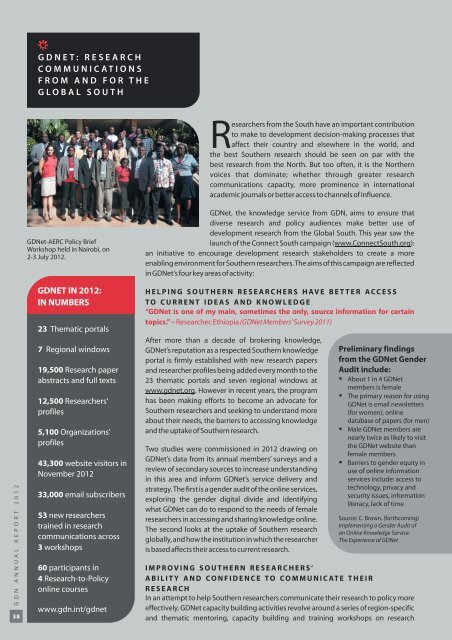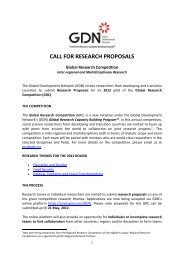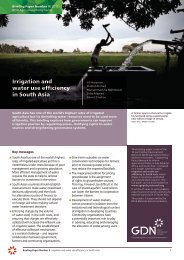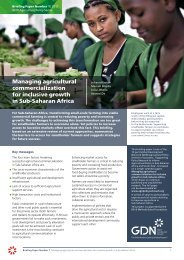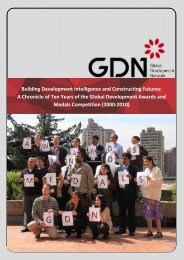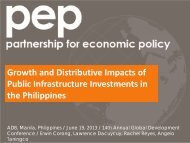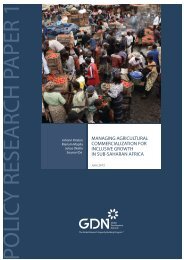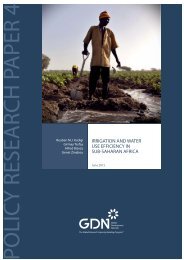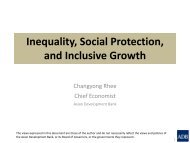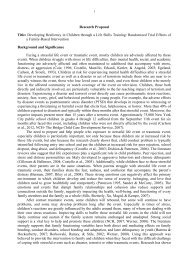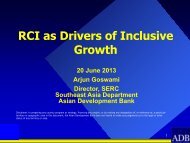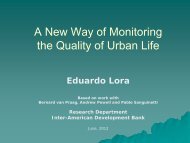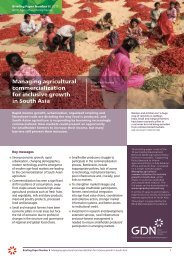ANNUAL REPORT - Global Development Network
ANNUAL REPORT - Global Development Network
ANNUAL REPORT - Global Development Network
Create successful ePaper yourself
Turn your PDF publications into a flip-book with our unique Google optimized e-Paper software.
GDNET: RESEARCH<br />
COMMUNICATIONS<br />
FROM AND FOR THE<br />
GLOBAL SOUTH<br />
Researchers from the South have an important contribution<br />
to make to development decision-making processes that<br />
affect their country and elsewhere in the world, and<br />
the best Southern research should be seen on par with the<br />
best research from the North. But too often, it is the Northern<br />
voices that dominate; whether through greater research<br />
communications capacity, more prominence in international<br />
academic journals or better access to channels of influence.<br />
GDNet-AERC Policy Brief<br />
Workshop held in Nairobi, on<br />
2-3 July 2012.<br />
GDNet, the knowledge service from GDN, aims to ensure that<br />
diverse research and policy audiences make better use of<br />
development research from the <strong>Global</strong> South. This year saw the<br />
launch of the Connect South campaign ( www.ConnectSouth.org):<br />
an initiative to encourage development research stakeholders to create a more<br />
enabling environment for Southern researchers.The aims of this campaign are reflected<br />
in GDNet’s four key areas of activity:<br />
GDN <strong>ANNUAL</strong> <strong>REPORT</strong> 2012<br />
38<br />
GDNET IN 2012:<br />
IN NUMBERS<br />
23 Thematic portals<br />
7<br />
Regional windows<br />
19,500 Research paper<br />
abstracts and full texts<br />
12,500 Researchers'<br />
profiles<br />
5,100 Organizations'<br />
profiles<br />
43,300 website visitors in<br />
November 2012<br />
33,000 email subscribers<br />
53 new researchers<br />
trained in research<br />
communications across<br />
3 workshops<br />
60 participants in<br />
4 Research-to-Policy<br />
online courses<br />
www.gdn.int/gdnet<br />
HELPING SOUTHERN RESEARCHERS HAVE BETTER ACCESS<br />
TO CURRENT IDEAS AND KNOWLEDGE<br />
“GDNet is one of my main, sometimes the only, source information for certain<br />
topics.”~ Researcher, Ethiopia (GDNet Members’ Survey 2011)<br />
After more than a decade of brokering knowledge,<br />
GDNet’s reputation as a respected Southern knowledge<br />
portal is firmly established with new research papers<br />
and researcher profiles being added every month to the<br />
23 thematic portals and seven regional windows at<br />
www.gdnet.org. However in recent years, the program<br />
has been making efforts to become an advocate for<br />
Southern researchers and seeking to understand more<br />
about their needs, the barriers to accessing knowledge<br />
and the uptake of Southern research.<br />
Two studies were commissioned in 2012 drawing on<br />
GDNet’s data from its annual members’ surveys and a<br />
review of secondary sources to increase understanding<br />
in this area and inform GDNet’s service delivery and<br />
strategy.The first is a gender audit of the online services,<br />
exploring the gender digital divide and identifying<br />
what GDNet can do to respond to the needs of female<br />
researchers in accessing and sharing knowledge online.<br />
The second looks at the uptake of Southern research<br />
globally, and how the institution in which the researcher<br />
is based affects their access to current research.<br />
Preliminary findings<br />
from the GDNet Gender<br />
Audit include:<br />
About 1 in 4 GDNet<br />
members is female<br />
The primary reason for using<br />
GDNet is email newsletters<br />
(for women), online<br />
database of papers (for men)<br />
Male GDNet members are<br />
nearly twice as likely to visit<br />
the GDNet website than<br />
female members<br />
Barriers to gender equity in<br />
use of online information<br />
services include: access to<br />
technology, privacy and<br />
security issues, information<br />
literacy, lack of time<br />
Source: C. Brown, (forthcoming)<br />
Implementing a Gender Audit of<br />
an Online Knowledge Service:<br />
The Experience of GDNet<br />
IMPROVING SOUTHERN RESEARCHERS’<br />
ABILITY AND CONFIDENCE TO COMMUNICATE THEIR<br />
RESEARCH<br />
In an attempt to help Southern researchers communicate their research to policy more<br />
effectively, GDNet capacity building activities revolve around a series of region-specific<br />
and thematic mentoring, capacity building and training workshops on research


